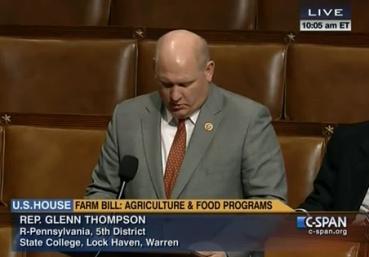WASHINGTON, D.C. – Yesterday, the U.S. House of Representatives passed the Agricultural Act of 2014, a five-year Farm Bill reauthorization, by a vote of 251-166.
The bill was produced by the House-Senate conference committee that was charged with resolving differences between the House and Senate-passed Farm Bills. U.S. Rep. Glenn ‘GT’ Thompson, PA-5, chairman of the House Agriculture Subcommittee on Conservation, Energy & Forestry and a member of the conference committee, issued the following statement:
“This farm bill is a big win for the nation’s economy and will support jobs across the Commonwealth of Pennsylvania, while making necessary reforms that will save taxpayers billions. I am proud of the hard work put forward by the members of the Conference Committee from both parties and chambers of Congress.
“Throughout this process, we have proved that positive movement on important pieces of legislation can be achieved. I urge the Senate to quickly pass this bill and get it to the President’s desk for his signature.”
Agriculture Policy:
- Repeals Direct Payments and limits producers to risk management tools that offer protection when they suffer significant losses.
- Limits on payments are reduced, eligibility rules are tightened, and means tests are streamlined to make farm programs more accountable.
- Provides historic reforms to dairy policy by repealing outdated and ineffective dairy programs.
- Supports small businesses and beginning farmers and ranchers with training and access to capital.
- Reauthorizes numerous research, extension and education programs, including programs for land grant universities; the National Institute of Food and Health (NIFA), and the Agricultural Research Service (ARS).
- Overall package reduces deficits by $16.6 billion over 10 years.
Nutrition Policy:
- Makes the first reforms to the food stamp program since the welfare reforms of 1996 while maintaining critical food assistance to families in need.
- Closes the “heat-and-eat” loophole that artificially increases benefit levels when states provide nominal LIHEAP assistance.
- Establishes a 10-state pilot to empower states to engage able-bodied adults in mandatory work programs.
Thompson-Sponsored Reforms:
- Includes the Forest Products Fairness Act, which would open new market opportunities for timber and forest products by allowing them to qualify for the U.S. Department of Agriculture’s BioPreferred Program.
- Contains Thompson’s language codifying the Forest Service’s authority to categorically exclude non-controversial, day-to-day activities from the National Environmental Policy Act (NEPA).
- Includes provisions that will help the Forest Service to use their budget and resources more efficiently, and to better manage forests.
- Improves the Farm Bill Conservation Title through the consolidation of 23 duplicative programs into 13, saving $6 billion.
- Provides certainty to the forest products industry by clarifying that forest roads and related silvicultural activities will not be treated as a point source under the Clean Water Act, and will no longer be subject to frivolous lawsuits.




